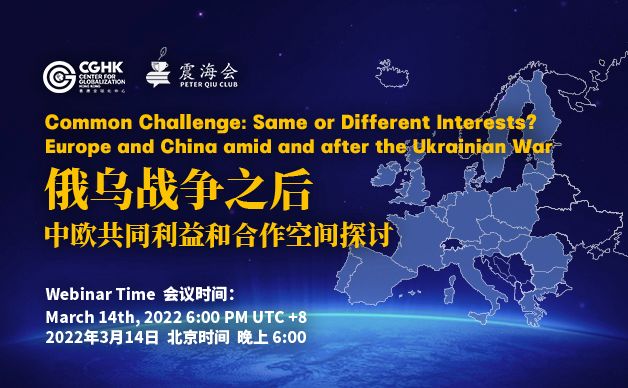
Volker Stanzel, the former German ambassador to China and Japan, warned that the situation would be "very dangerous" when the world could return to the unstable international order before the establishment of the United Nations in 1945 after the Russian-Ukrainian war.
On Monday (14th), Stanzel analyzed the impact of the Russian-Ukrainian war on the international order at an online webinar held by the Center for Globalization Hong Kong (CGHK) and Peter Qiu`s Club. Under the circumstance of Western sanctions, Russia may become a client state of China. And will be highly dependent on China for exports of goods and arms.
However, Stanzel pointed out that if Russia flexibly avoid sanctions, such as admitting defeat in some way and withdrawing from Ukraine, the West may gradually remove sanctions against Russia. If Putin is no longer in power, Russia may even reintegrate into the international community and draw closer relations with Europe and the United States. Under such circumstances, China, which claims that the Sino-Russian friendship is "rock solid", may weaken its international status.
The webinar was chaired by Dr. Peter Qiu, founder and chairman of the CGHK, and attended by scholars including Dr. Feng Zhongping, director of the European Institute of the Chinese Academy of Social Sciences.
Dr. Peter Qiu believes that two international orders may emerge after the Russian-Ukrainian war. The world may form the US-Europe bloc and the China-Russia bloc, the two sides will face each other in an all-round way, and even a new war may break out. The result will be "catastrophic".
Another possibility is that the confrontation between the United States and Russia continues, and China and Europe still prefer Russia and the United States, but both sides are moving closer to the middle point. Even if China and the EU cannot resolve their differences, they can still engage in dialogue and work together to avoid war.
Dr. Feng agrees with this point of view. He believes that China and Europe may change the world. As long as China and Europe can stand at the middle point, the world will be different from the Cold War period, and it can maintain a "comfortable state", and economic, trade, investment, and cultural exchanges can continue.
In response to this, Stanzel reminded that this actually means that the international order has returned to the state before the establishment of the United Nations in 1945. He explained that although the UN mechanism is not perfect, it has at least established a rules-based international order. If there are two hostile blocs existing in the world, with a third party like the EU in the middle, and the relatively independent Britain, India, Latin America, the world will become unstable and very dangerous.
The United States and Europe showed close coordination in the early days of the Russian-Ukrainian war, but the United States announced a ban on Russian energy imports on the 8th of this month, and major European countries, including Germany and France, refused to cooperate. Since the 8th, high-level Chinese leaders have had seven phone calls with high-level European countries, and China and the European Union have also scheduled a summit on April 1st.
Many analysts believe that there has been a crack in the relationship between the United States and Europe, and China and Europe may be brought closer together.
"If you asked me three months ago, I would have said that most European countries are pessimistic about China-EU relations," Stanzel said frankly.
But the Russian-Ukrainian war made Europe realize that China is far less aggressive than Russia, and that China is a country that then can communicate.
Stanzel believes that if China and the EU can jointly establish a dialogue mechanism and framework for the Russian-Ukrainian war, this will be an "extremely positive signal." But for this to happen, there must be "disruptive changes". He said that if China can successfully mediate the Russian-Ukrainian war and ensure that no side is disadvantaged, the basis for dialogue between China and Europe will be "very different".